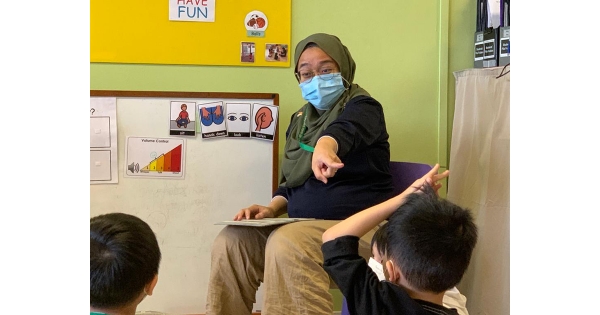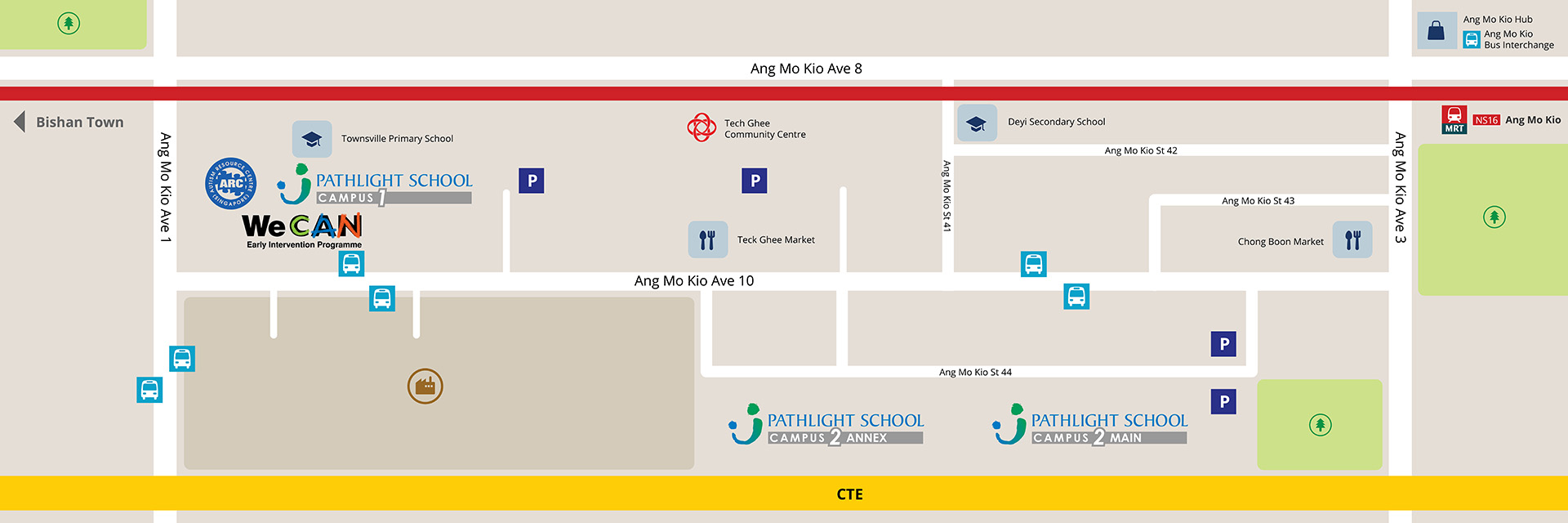The WeCAN Early Intervention Programme (EIP) provides a comprehensive range of child services to support families and their children with autism aged 6 years and below. These services are autism-specific and specially tailored to meet the individual needs of the families and their children.
These child services include:
- Autism Intervention for Children
- Training for Families and Carers
- Transition Planning for Child
- Information and Referral
Our Curriculum
The WeCAN EIP follows the ARC(S) Intervention Focus Areas Pyramid

Intervention typically begins with the base of the pyramid (in a 1:2 context supported by teacher and carers) and works upwards towards social relationships (in a small group learning context)
Teachers will work closely with the parents on goal setting and implementation on a regular basis.
Intervention Journey
Every child who enters the programme begins a journey with us. The programme endeavours to provide the appropriate support to help each child move from one sign post to the next in this intervention journey.
1
Assessment
The first step of the intervention journey begins with assessment of the child's learning needs.
Children are first assessed in the following areas:
- Interests / motivators
- Learning needs and styles
- Work habits
- Self-regulation
- Functional social and communication skills
- Risk Factors
Information from all sources is referenced to develop the most suitable individualised plan for the child.
Regardless of the level of entry, every child typically begins with a period of paired intervention (two children with one adult). They start in a smaller intervention room, focusing on basic intervention goals. Children are individually assessed and monitored on individualised goals.
2
Levels of Learning
There are three (3) main learning levels:
At this level, the focus is on areas of:
- Basic Compliance and Work Habits
- Engagement and Self-Regulation
- Functional Communication Using Conventional Means
Intervention at this level aims to prepare the child be ready for learning. We work on the skills in areas of child engagement and "learning to learn". This is done through intensive adult-led learning activities in direct teaching conducted in pairs. Parents and caregivers are actively involved in the intervention at this stage.
Typically, an individual session will be 1 hour and 30 minutes and cover the following:
- Arrival / Departure routines
- Work with teacher
- Circle time
- Gym
- Art and Craft
- Independent work
- Play with Adult
- Parent training
At this level, our intervention focuses on teaching skills that help children become more independent and effective communicators.
Areas of focus include:
- Social Communication
- Group Learning
- Independence
Children at this level learn in a group size of between 4-6 children with a minimum of two teachers.
Children may participate in a combination of different curriculum teaching focus areas during the course of each session. These include:
- Arrival / Departure
- Circle Time
- Gym
- Play (Indoor and Outdoor)
- Art and Craft
- Snack
- Table Activities
At this level, our intervention focuses on preparing our children for a social learning context. The children are in a ratio of between 6-8 children with at least two teachers.
Areas of focus include:
- Larger group learning
- Social Skills
- Problem Solving
3
Transition Planning and Preparation
Children in the WeCAN Early Intervention Programme (EIP) are served until the year they turn six (6). From day one when they join our programme, we pro-actively prepare parents and children for their post EIP placements which could be a mainstream setting, a special education school or a privately-run programme. Each child's journey in intervention will be different, and reflect the wide variety in learning needs and abilities.
At the end of every term, we review our children's progress on their individual goals and discuss with parents about the next steps of intervention. The recommendations could involve an extension of learning in achieved goal areas, a change in focus due to developing areas of learning needs or a move to a different group and classroom size to focus on learning in a different social context.
At the start of the year the child turns five (5), we will engage with parents in transition discussion and planning. Transition options are discussed and parents are guided on the steps for placement assessments.
Children at this stage will also learn transition skills that are relevant to them and these could include:
- School routines
- Managing test and exams
- Group learning
- Independent skills




